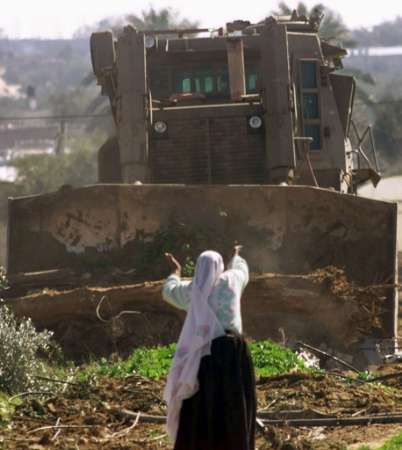
Steve Weizman in Jerusalem, 30 March 2003, The Associated Press
With U.S. forces in Iraq coming up against suicide attackers and wary of ambush by hostile forces mingling with civilians, the military has been listening closely to Israeli experts and picking up tips from years of Israeli army operations in Palestinian areas and Lebanese towns.
Martin Van Creveld, professor of military history and strategy at the Hebrew University of Jerusalem, briefed U.S. Marine Corps officers in September at Camp Lejeune, N.C. He said he was quizzed about the April 2002 battle in the Jenin refugee camp, where 52 Palestinians and 23 Israeli soldiers were killed in fierce firefights as troops hunted suspected militants. The refugee camp's narrow alleys at first prevented Israeli tanks from advancing against about 150 Palestinian gunmen. Instead, infantrymen backed by helicopter gunships slowly made their way forward, moving house to house by blowing holes through inner walls, limiting exposure to dangerous streets where militiamen had planted explosives and snipers waited on rooftops. At the time, Israel was widely accused of having used excessive force, but the army said it made every attempt to spare civilians - and that this was a factor in the high Israeli death toll.
Van Creveld said he told his hosts the most effective tools in Jenin were Apache helicopters and giant, armored D9 bulldozers that cut wide swaths through alleys to clear the way for tanks. The D9s are manufactured for civilian use in the United States but fitted with armor in Israel. The Americans have bought nine of the converted machines from Israel, Van Creveld said. A spokeswoman at Israel's Defense Ministry declined to comment.
The U.S. armed forces are also using Israeli-made Pioneer pilotless planes to scout Iraqi defenses. Van Creveld said he counseled against the use of helicopters in Baghdad, where they would be more at risk than against the lightly armed Palestinians in Jenin. A U.S. Apache was forced down by ground fire over central Iraq on Monday and its two-man crew taken prisoner.
Neither the Pentagon nor the Israeli army are publicly giving details of their cooperation. But Israeli security sources said the American military requested - and received - reports on the Israeli army's techniques in built-up Palestinian areas, including videotaped records of incursions. An Israeli security source said American officers visited a mock-up of an Arab town used for training in an Israeli army base and received a briefing on urban combat procedures. In January and February, Israeli and American troops trained together in southern Israel's Negev desert, focusing on air defenses. Israel has also hosted senior law enforcement officials from the United States for a counterterrorism seminar.
The Israeli press was quick to point out the similarities between Israel's Arab wars and the coalition campaign in Iraq. The Maariv daily on Wednesday paired strikingly similar shots from Iraq and the Palestinian areas: smoke of explosions hanging in the air over Baghdad and Gaza; Arab prisoners with their hands behind their heads in Basra and Nablus; weary troops dozing by roadsides in southern Iraq and Bethlehem.
The images are not lost on Palestinians.





